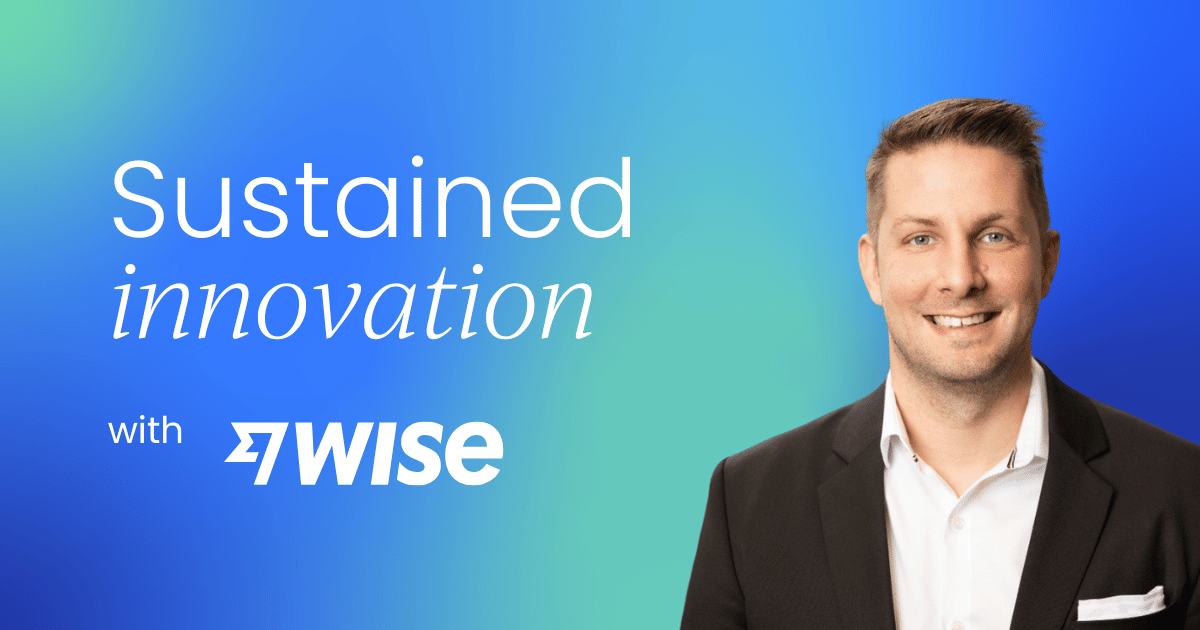This article is based on Balazs Barna’s brilliant talk at the Product-Led Summit in Austin. PLA members can enjoy the complete recording here.
Building great products isn’t just about writing code or shipping features – it’s about having the right mission, the right people, and the right culture to keep innovation sustainable. Companies that scale successfully don’t just chase ideas; they build systems that turn ideas into impact.
I’m Balazs Barna, Head of US Engineering at Wise, and in this article, I want to share how we think about product-engineering culture at Wise and how it’s helped us scale from a scrappy startup to a global financial infrastructure company serving 16 million customers.
Wise (formerly TransferWise) started with a simple but powerful mission: make international money transfers faster, cheaper, and more transparent. Today, that mission has expanded into a broader vision – powering cross-border finance for individuals, businesses, and banks like Morgan Stanley, Monzo, and Nubank.
But our success isn’t just about the products we’ve built; it’s about how we’ve built them – by focusing on autonomous teams, hiring the right engineers, and making sure our people have a deep understanding of the customer problems they’re solving.
In this piece, I’ll walk you through the mindset and principles that drive our approach, including:
- The importance of mission and strategy – and how the Hedgehog Concept keeps us focused
- How Wise empowers autonomous teams instead of relying on top-down decision-making
- Why product managers need to think like mini CEOs
- The importance of hiring product engineers over traditional engineers
- When to move fast and when to slow down – the balance between speed and thoughtful decision-making
- Why the customer experience doesn’t stop at the product – and how staying close to customers fuels better solutions
If you’re looking for a better way to scale product innovation, I hope this gives you some useful insights. Let’s dive in.
The foundation of great products: People and culture
At Wise, we believe that great products don’t create great companies – great people do. It’s easy to get caught up in features, roadmaps, and strategy, but at the end of the day, the quality of your product is a direct reflection of the people who build it.
This idea is something our founder has spoken about often, and it’s best summed up in these two tweets:
Think of it as a flywheel effect:
- Great people build great products.
- Great people maintain a great culture.
- A strong culture attracts more great people.
This cycle is what makes companies successful over the long term. It’s why hiring and culture are more than just HR concerns – they’re fundamental to product development itself.
Why mission matters
Of course, even the best people need a reason to come together. That’s where the mission comes in. A strong mission aligns teams, creates focus, and drives better decision-making.
For us, the mission was clear from the start. International money transfers were a broken experience – slow, expensive, and frustratingly opaque. Your money would take days to arrive, and you never knew exactly how much the recipient would get.
We set out to fix that by making international payments instant, seamless, and radically cheaper than traditional banks.
A strong mission acts as a north star, helping teams prioritize what truly matters, but a mission alone isn’t enough – you also need a strategy to execute it effectively.
That’s where the Hedgehog Concept comes in, and it’s a key reason we’ve stayed focused while growing.
Sticking to what works: The Hedgehog Concept
A strong mission gives teams direction, but it doesn’t tell you how to achieve your goals. Strategy bridges that gap, ensuring that every decision supports long-term success. At Wise, we’ve shaped ours – whether intentionally or not – around a principle called the Hedgehog Concept.
Coined by Jim Collins in Good to Great, this idea comes from a study of companies that outperformed the S&P 500 for 15 consecutive years. The key takeaway? The most successful companies don’t spread themselves thin. Instead, they focus on what they can uniquely excel at and stick to it relentlessly.
Collins found that these companies built their strategy around three key factors:
- Passion: They deeply care about what they’re doing.
- Profitability: Their strategy makes financial sense, ensuring long-term sustainability.
- Excellence: They focus on what they can be the best in the world at.
At Wise, this framework has guided our approach to product and growth, even if we weren’t consciously following it at first.
Our strategy? To solve the problems that consumers and small businesses face in moving money across borders, we will build a low-cost, high-quality infrastructure to power our apps and partners.
Everything is captured in that one sentence:
- Who we serve (consumers and small businesses)
- What problem we solve (moving money across borders)
- How we do it (low-cost, high-quality infrastructure)
This level of clarity isn’t just helpful – it’s essential.
The power of focus
A strong strategy isn’t just about what you do – it’s also about what you don’t do.
As a company grows, opportunities multiply. New markets, new customer segments, new product ideas – it’s tempting to chase them all. But doing so spreads your resources thin and dilutes your impact.



 Follow us on LinkedIn
Follow us on LinkedIn



